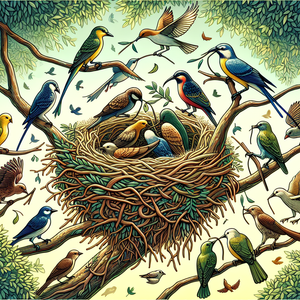The Art of the Side Hustle: How Vance Turned Passion Projects into Profit

Vance's foray into the realm of side hustles began with a deep-seated need for self-discovery. Like many professionals, he felt unfulfilled in his corporate job, yearning for an outlet that would allow him to express his creativity. To embark on this journey, Vance first identified his passions: photography, graphic design, and writing. Each of these interests not only brought him joy but also held the potential for monetization.
Diversifying Income Streams
As Vance gained confidence and experience in photography, he recognized the importance of diversifying his income streams. He understood that relying solely on one source of revenue could be precarious, especially in the freelance world where demand can fluctuate. To mitigate this risk, Vance began to explore additional avenues for income generation.
Building a Brand
A pivotal aspect of Vance's success in his side hustles was his keen focus on personal branding. He understood that a strong brand identity would differentiate him in an increasingly crowded market. Vance invested significant time in crafting a cohesive online presence across various platforms, where he showcased his work, shared testimonials, and engaged actively with his audience.
Learning from Challenges
While Vance's journey into side hustles was largely successful, it was not without its challenges. One significant setback occurred when a major client unexpectedly canceled a contract, leaving him scrambling for income. Rather than viewing this as a defeat, Vance adopted a growth mindset and used it as an opportunity to learn.
Vance's journey through the art of the side hustle exemplifies how passion, creativity, and strategic thinking can lead to financial success and personal fulfillment. By diversifying his income streams, building a strong brand, and learning from challenges, he successfully transformed his side projects into a thriving enterprise.
Freelance Photographer
Freelance photographers often work independently but may contract with event planners, marketing agencies, and local businesses.
Core Responsibilities
Capture high-quality images for various clients, including events, portraits, and products.
Edit and retouch photos using software like Adobe Photoshop and Lightroom.
Build and maintain a portfolio showcasing unique photography styles and techniques.
Required Skills
Proficiency in photography equipment and editing software.
Strong communication skills for client interactions and managing expectations.
Creativity and an eye for detail to produce compelling visual content.
Graphic Designer (Freelance)
Freelance graphic designers often collaborate with startups, marketing firms, and small businesses.
Core Responsibilities
Design visual content for branding, marketing materials, and social media platforms.
Work with clients to understand their vision and deliver designs that meet their needs.
Stay updated on design trends and software advancements to ensure contemporary and appealing work.
Required Skills
Expertise in design software such as Adobe Illustrator, Photoshop, and InDesign.
Strong portfolio that demonstrates versatility in design styles and projects.
Ability to manage multiple projects and meet tight deadlines.
Content Creator (Blogging/Vlogging)
Many content creators work independently but may partner with brands for sponsored content or affiliate marketing.
Core Responsibilities
Develop engaging content for blogs or video platforms that resonates with a target audience.
Utilize SEO best practices to optimize content for search engines and increase visibility.
Engage with followers through social media to build a community and promote content.
Required Skills
Excellent writing and storytelling skills or strong video editing and production skills.
Knowledge of SEO, social media marketing, and audience engagement techniques.
Creativity and adaptability to trends and audience feedback.
Social Media Manager
Social media managers are often hired by marketing agencies, corporate brands, and small businesses looking to enhance their online presence.
Core Responsibilities
Develop and implement social media strategies to enhance brand visibility and engagement.
Create and curate content tailored to each platform, ensuring consistency in messaging.
Analyze social media metrics and adjust strategies based on performance data.
Required Skills
Strong understanding of various social media platforms and their unique audiences.
Excellent communication and copywriting skills for crafting compelling posts.
Experience with social media analytics tools to measure and report performance.
Digital Marketing Specialist
Digital marketing specialists are commonly employed by marketing agencies, e-commerce businesses, and tech companies.
Core Responsibilities
Plan and execute online marketing campaigns, including email marketing, PPC, and social media ads.
Conduct market research and analyze trends to identify new marketing opportunities.
Collaborate with cross-functional teams to align marketing strategies with business goals.
Required Skills
In-depth knowledge of digital marketing tools and platforms such as Google Analytics, AdWords, and social media advertising.
Strong analytical skills to interpret data and make strategic decisions.
Creativity in developing innovative marketing solutions and campaigns.


